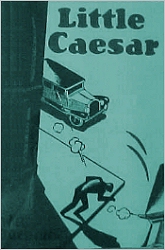 |
Little CaesarW. R. Burnett |
|---|
 |
Little CaesarW. R. Burnett |
|---|
W.R. Burnett's Little Caesar begins in a back room at Chicago's Club Palermo. The owner, Sam Vettori, outlines a plan for his gang to rob the Casa Alvorado nightclub at midnight on New Year's Eve. An accomplice in the floor show will signal them in and later misdirect the police. Cesare "Rico" Bandello, leader of the robbery crew, is a small, slim young man with dreams of wealth and power. When Rico shoots an off-duty police official during the holdup, his reputation as tough guy is esablished. He returns to the Club Palermo and challenges Vettori in front of the others, and the gang smoothly changes hands with no further bloodshed. Rico's utter ruthlessness is shown when he kills his young getaway driver, who had gone to confess his sin to a priest, leaving him to die on the cathedral steps.
For the next year the gangster's power steadily increases. He conducts bold territorial raids and displays open contempt for the lawmen who shadow him. Soon, kingpin Diamond Pete Montana bows to Rico's power. Even the racketeer-politician known as the Big Boy expresses admiration. His fall begins when the Casa Alvorado inside man, after days of relentless questioning by detectives, cracks and names Rico as the triggerman in the New Year's Eve robbery. Rico's friend Otero dies at the hands of pursuing lawmen while rushing his chief out of town. The "big man" himself escapes, first to Hammond, Indiana, then to a gang hideout in Toledo, where he assumes a false identity.
Rico's fatal flaw is his arrogance. He bristles at the patronizing manner of the Ohio hoods, who know him only by an alias and think him old-fashioned. One night, unable to bear their taunts any longer, he draws himself up and snarls, "I'm Rico!" Within days, one of the men drunkenly passes the news on to a Chicagoan, and Rico must again run for his life. As he dashes up an alley, a police officer shouts for him to surrender. Instead, Rico whirls, a pistol in his hand. The officer fires. Fatally wounded, the gangster can only utter a desperate cry as he finally realizes his own mortality: "Mother of God, is this the end of Rico?"
Conversations and text alike are peppered with slang. The British publishers of Little Caesar were so baffled by the language that they included a three-page glossary with the first edition, some of the terms laughably mistranslated: "yegg," for example, which means a safe-robber, was given the genteel definition "a fellow."
Many critics lauded Burnett's originality and power in this first of the mainstream gangster novels. Burnett's first novel has characteristic traits that become constants in his future work. The hallmark of any Burnett novel is tight, terse, ahnost staccato prose. Nonessential words are excised. Sentences and paragraphs are short, and speech is rendered realistically: Rico got on a streetcar.
"Well, how's things?" he said to the conductor.
"All right," said the conductor; "getting cooler, ain't it?
Reckon we'll have winter before we know it."
"Yeah," said Rico.
Gangsters were a familiar subject by 1929. They were denounced on the front page of big-city newspapers, portrayed on the motion picture screen, and fictionalized in popular novels, plays, even poetry. Rico Bandello, however, was something altogether new. He was not a stock villain, a comic figure, or a straw-man set up for the purpose of psychoanalysis, as was the title character of Frank Packard's The Big Shot (1929). Instead, Rico was a sharply drawn antihero who just happened to be a gangster.
Burnett's heroes are invariably lower-middle-class men who long for a better life and will do whatever it takes to attain it. Their success, however, depends upon Fate. They may fall victim to their own hubris, or to the treachery of an associate, or to blind chance--or even, as in Rico's case, to a combination of all three. For Burnett, though, failure does not necessarily mean a violent end. As the writer makes clear in later books, he considers humiliation a worse punishment than death.
Little Caesar was quickly bought as a motion picture property. Studio head Jack L. Warner later claimed that he discovered it when a friend handed him a copy to while away a long train trip. Director Mervyn LeRoy told a different story: Warner handed him a set of galley proofs to look over, saying that he had no time to read them himself. In his autobiography, Mervyn LeRoy: Take One (1974), the director remembers he "read straight through the night, my excitement heightening with every page." He rushed back to the studio and convinced Warner to purchase the rights. However the deal came about, the picture was made in 1930, starring Edward G. Robinson in a star-making role. To avoid trouble with local censorship boards, Rico's last line was altered to "Mother of Mercy" in most prints. Little Caesar (1930) is deservedly considered one of the finest and most exciting movies to emerge from the early talkie period.
--BRUCCOLI CLARK LAYMAN, from
Dictionary of Literary Biography.
A selection of Little Caesar related fiction.
|
Find Little Caesar on eBay.com
A selection of Little Caesar related non-fiction.
|
|
home: The Film Noir 'net |
back to: NOIR LITERATURE |
|
Any comments, additions or suggestions
should be addressed to: The Film Noir 'net / Eric B. Olsen / ericbolsen@juno.com |
Other Web Sites:
History of Horror Hard Bop Homepage The War Film Web Author Eric B. Olsen |